This post may contain affiliate links. Please see our disclosure policy.
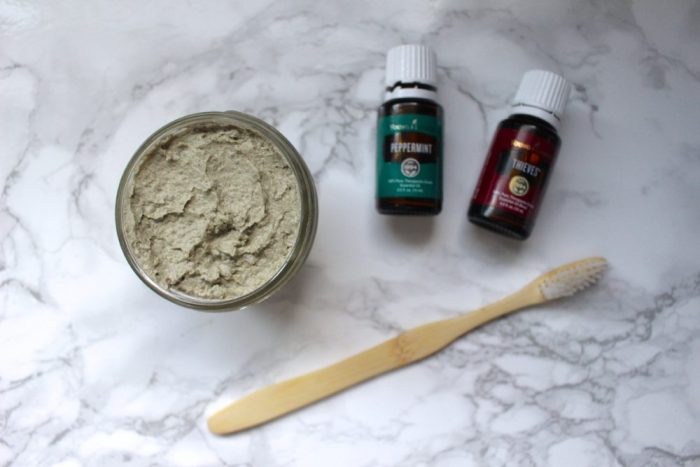 Homemade clay toothpaste is something I started attempting after I became a fan of Earthpaste, an all-natural toothpaste without chemicals and additives. I hate that conventional toothpaste contain hormone disruptors like triclosan and fluoride, unnecessary artificial sweeteners, and foaming agents like DEA which is linked with various cancers. No thank you. While Earthpaste worked for me for a while, I didn’t like that it had a sweet flavor and I thought it would be fun to make my own.
Homemade clay toothpaste is something I started attempting after I became a fan of Earthpaste, an all-natural toothpaste without chemicals and additives. I hate that conventional toothpaste contain hormone disruptors like triclosan and fluoride, unnecessary artificial sweeteners, and foaming agents like DEA which is linked with various cancers. No thank you. While Earthpaste worked for me for a while, I didn’t like that it had a sweet flavor and I thought it would be fun to make my own.
As a side note, my dental health has improved dramatically through the past several years as I changed my diet and started using natural toothpastes. Remember: your dental health reflects your overall health in general, so if you find that you are prone to cavities and inflammation in your gums, it’s worth looking into your diet and finding out what imbalances are happening in your body.
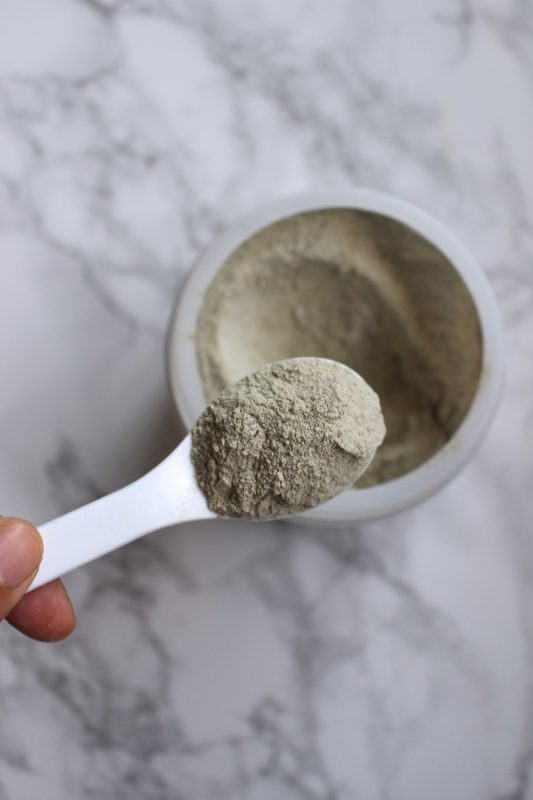
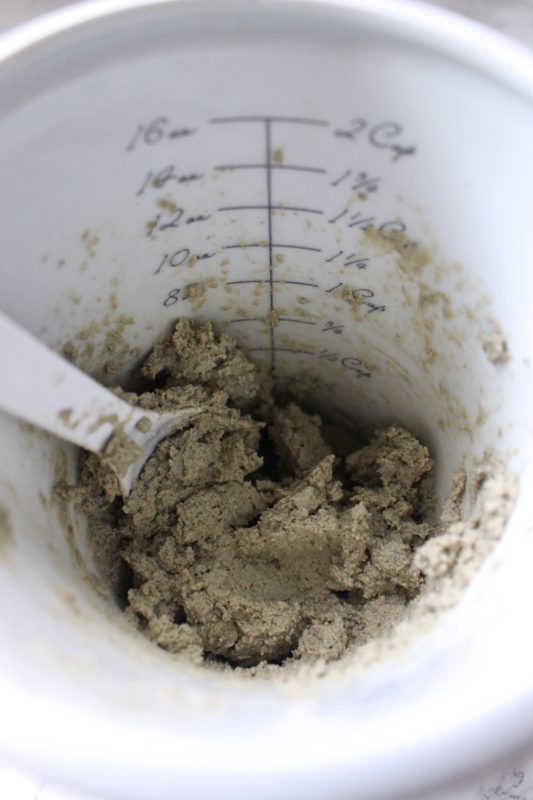

Why Use Clay?
Clay, specifically bentonite clay, is known to contain an abundance of beneficial trace minerals and vitamins and has traditionally been used to boost immunity and to treat mineral deficiencies. It also has an amazing quality of binding to heavy metals, toxins, bacteria, and harmful substances so they can be removed from body. When used in toothpaste, it helps remineralize our teeth with calcium and magnesium, and its binding component also cleans out the mouth of any bacteria that may be forming.
Coupled with stain-reducing baking soda, the antibacterial component of coconut oil, and essentials oils that optimize their effectiveness, this recipe makes an awesome toothpaste that leaves your mouth feeling clean and refreshed.
Remember, When Using Bentonite Clay…
Bentonite clay should NOT come in contact with any metals. When this happens, it loses its effectiveness because it absorbs the metals that it comes in contact with. When using bentonite clay, use glass, ceramic, or plastic with your utensils and containers.
Also, I recommend you purchase bamboo toothbrushes to reduce your exposure to plastic (something like this). Making small changes to our daily routine can ensure that we reduce the amount of toxins that enter our body and the environment, while saving money at the same time if you go the DIY route!
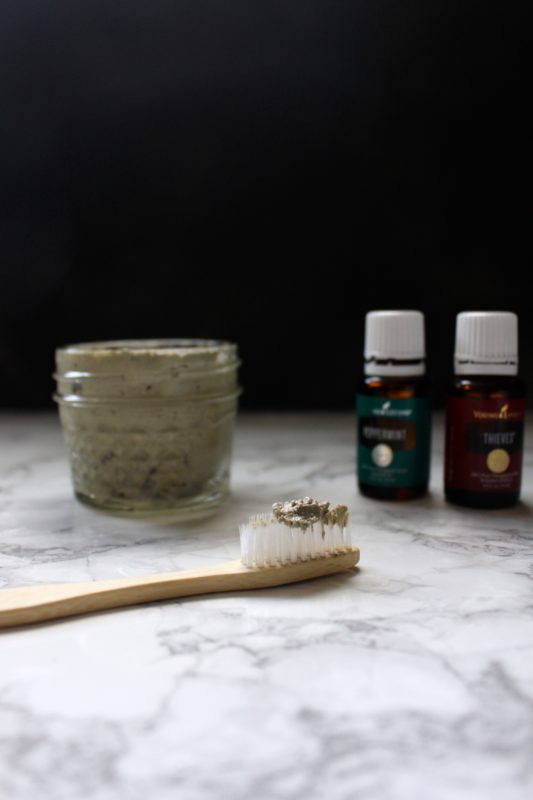
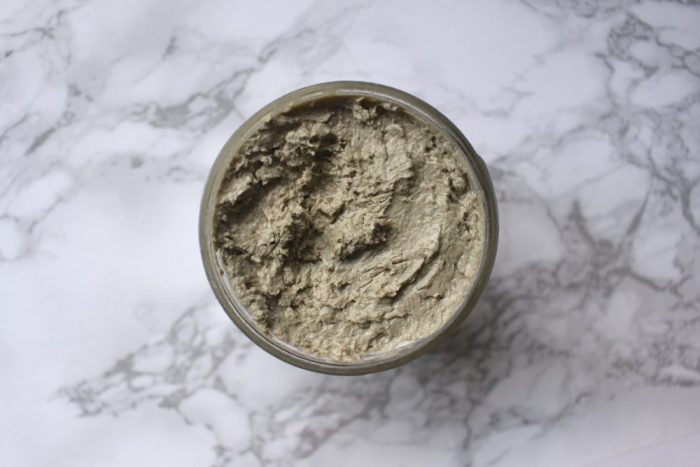
Homemade Clay Toothpaste Recipe
Ingredients
- 3 tbsp bentonite clay
- 1/4 cup filtered water + more, if needed
- 2 tbsp coconut oil, melted
- 2 tsp baking soda
- 15-20 drops of essential oils (I like the combo of peppermint and thieves)
Instructions
- In a glass, plastic, ceramic container (do NOT use metal), mix together bentonite clay, melted coconut oil, and water with a non-metal spoon until well-mixed.
- Add baking soda and essential oils and mix again.
- If the toothpaste is too thick, add a little bit of water at a time until it reaches the right consistency.
- Put in a glass or plastic container, where you can dip your toothbrush to use the toothpaste. Alternatively, if you have other people using the toothpaste as well, you can store in a bpa-free plastic squeeze tube.
Regarding other affiliate links and affiliate relationships: In order for me to support my blogging activities, I may receive monetary compensation or other types of remuneration for my endorsement, recommendation, testimonial and/or link to any products or services from this blog. Thank you for your support and understanding.



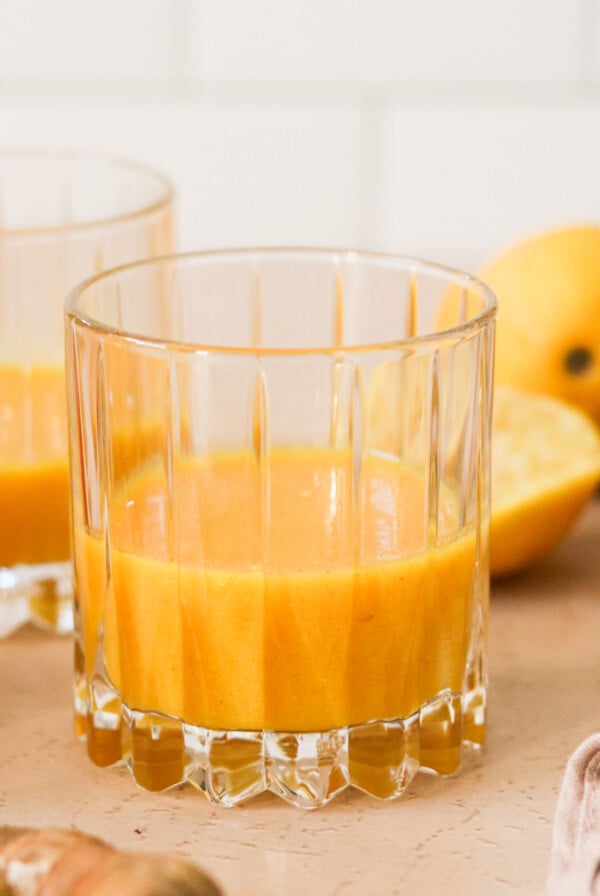
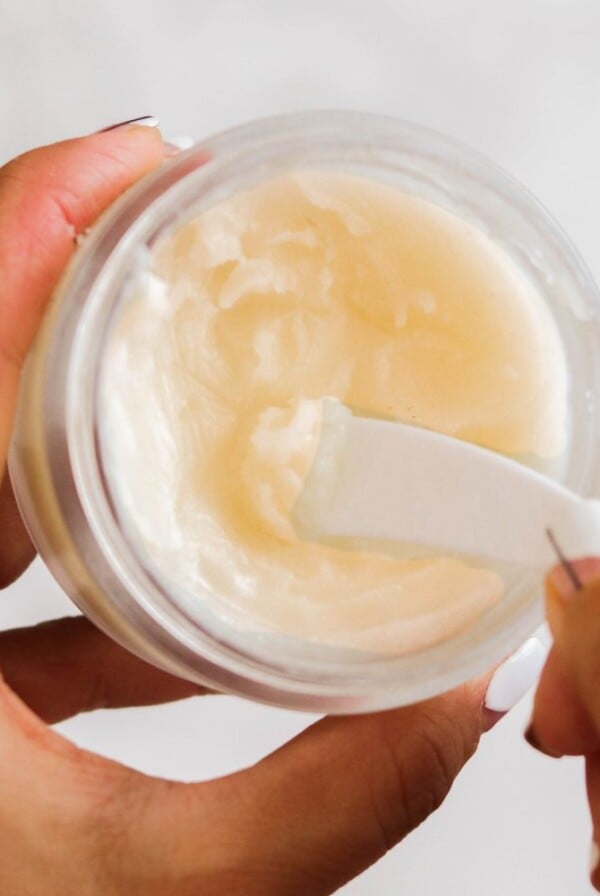
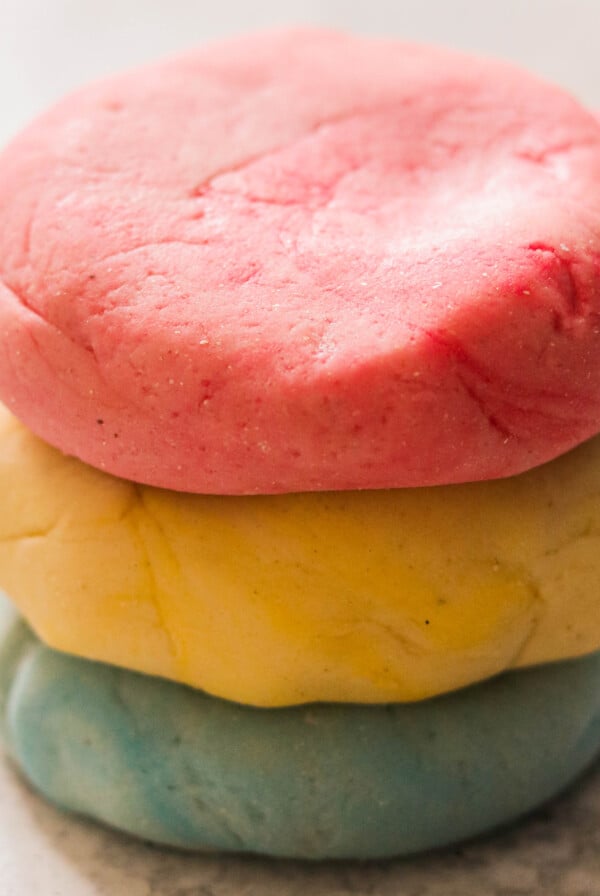
Hi there. I was wondering if fractionated coconut oil would work, since there are some concerns about clogging up plumbing. Have you tried that? Or do you need the solidifying of the regular coconut oil?
Thanks!
I never had issues with my plumbing and I’ve used this for months. Fractionated coconut oil may make the consistency a bit thinner than a regular toothpaste but you can definitely try it out and it’ll still be effective!
Hey there! I really want to try this toothpaste. Where do you find your bentonite clay? I’ve only seen things that say they are for facial masks.
The one I use is linked in the recipe: http://amzn.to/2xpQuuD Most of them will say they are used for facial masks but they are safe to use in toothpastes as well.
The uses & benefits of Bentonite Clay are many (e.i.: detoxifier such as removing heavy metals; aids digestion, etc). When researching the internet, the comments & info. reap countless tips of wisdom. An excellent quality Bentonite Clay is sold by Redmond. It won’t be difficult to find where to purchase as Vita Cost, Swanson, Walmart, Redmond, etc. have sales @ times. Our Creator has blessed us with so much & we know so little of His natural gifts. Hope this helps!
Hi! tried using it for several days but unfortunately it hurt my gums(some bruising and bleeding).
at first i thought that maybe it’s the brush itself so I let my girlfriend use the paste and she experienced the same problem.
maybe I should use more water or coconut oil?
this is the product I used:
https://www.amazon.com/Viva-Doria-Indian-Healing-grams/dp/B01MG8ECO9/ref=sr_1_2_s_it?s=beauty&ie=UTF8&qid=1541499437&sr=1-2&keywords=bentonite%2Bclay&th=1#customerReviews
I think it might be be because you used sodium bentonite clay, which is harsher and more powerful that calcium bentonite clay that I suggest. I recommend switching it to the latter. Sodium bentonite clay is also not safe for consumption in high amounts because it has a very high sodium content so make sure to spit it out really well!
I also had some bleeding but I’m using the clay that you recommended…is that normal?
Hi! I was wondering, do you spit it in the sink or in a bin?
In the sink! I’ve never had issues with it clogging up the drain, and I’ve used it for over a year.
Hi, I made this toothpaste and think it’s great. A question I have; is there any way to leave my breath smelling fresh as my partner says she can still detect an odour or is that the purpose of the essentail oils
Yes, the essential oils work well to freshen up your breath!
You can use peppermint essential oil for odor and freshness, and orange essential oil for whitening. Be careful of how much orange you use because too much burns your mouth. I usually have 1 to 2 drops worth.
Hi, I just made a batch of this and put it in a small glass jar. It was pretty full to the top. When I came to brush my teeth about two hours later, the jar had exploded and the contents was still fizzing out of it! Was quite funny because it was so unexpected. You don’t mention this in your recipe – has this happened to you? I used the quantities you suggested.
(it still tasted and felt amazing though!)
Oh man, I’m so sorry that happened! That’s never happened to me before. Was your coconut oil hot by any chance? Maybe that could have expanded the jar? If not, then it could be the baking soda reacting with the liquids. Maybe next time, you can air it out without a lid for 10 minutes after making it or so before closing it so the carbonation reaction is finished before you store it away.
Thanks for replying Jean! I’ll maybe put a bit less baking soda too. Practice makes perfect 🙂
Using they clay and coconut oil- does this cause any problems with plumbing?
Hmm, I’ve never experienced that and I’ve used it for over 6 months. If you are nervous though, maybe you can spit it out in the garbage can.
I have been using a versus if this without coconut oil for years and it does cause plumbing difficlties. I have to use something to “melt” the clay every few months. But it’s worth it!
I would love to try this for my family! I just had a couple questions. Does it need to be refrigerated after making it? How long does it last? Does it go bad if you don’t use it within a certain length of time?
I didn’t keep it in the refrigerator and it kept for about a month, but I used most of it anyway. It will definitely keep longer in the refrigerator if you aren’t going to use it up that fast.
I have old fillings in my mouth. Can I still use this? They’re the old metal fillings ( I forget what they’re called).
Yes! Bentonite clay is actually prescribed by holistic dentists to help detox your body from these fillings. It works by attracting, then binding them so they can be safely eliminated by the body.
Totally agree! I first had those Mercury fillings removed ( Safely!) And now continue detoxing with your toothpaste & Activated Charcoal.
Thanks for your recipe ❤️
Great, that was my question also. Thank you.
Dental Amalgam fillings contain Mercury. I had 6 fillings placed when I was a teenager. I recently had them all removed safely. I think you should have them replaced with porcelain natural fillings like I just did. I love using this fabulous natural toothpaste. When you brush with any toothpaste & you have Mercury fillings it not good! Good luck!
I just made this toothpaste yesterday, and I love it! My teeth feel like I’m fresh from a professional cleaning! The taste definitely won’t be up everyone’s alley- it’s a little bitter because of the baking soda, but I love the fresh feeling and flavor that’s left in my mouth after I use it. I love even more the fact that all of the ingredients are things that are beneficial to my body, and I actually know what they are! This is totally my new toothpaste! And it really didn’t take but a few minutes to make. I wish I had done it sooner! Thanks, Jean!
So glad you like it, Laurie! Yes, it does taste slightly bitter, but once you get used to it, you don’t really taste it anymore. Thanks so much for your kind words!
My moutwash recipe uses xylitol, so I put 2tsp. in my toothpaste and I think it is good